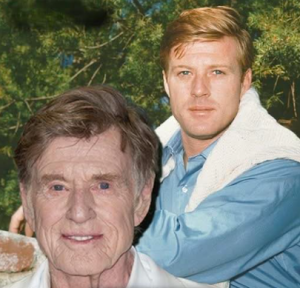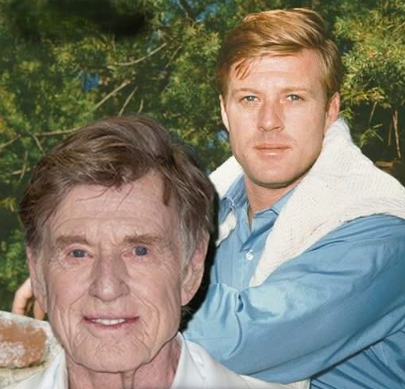
Robert Redford (1936–2025): The Last Golden Boy
He died in his sleep, surrounded by mountains and memory. On September 16, 2025, Robert Redford — actor, director, activist, and founder of the Sundance Film Festival — passed away at his home in Utah at the age of 89.
And with him, something else passed: a particular kind of American myth. The sunlit rebel. The thoughtful cowboy. The man who could charm you with a smile and devastate you with silence.
Redford wasn’t just a star. He was a symbol. And now, we gather around his legacy like mourners around a campfire, telling stories to keep the light alive.
The Face That Launched a Thousand Films
Born Charles Robert Redford Jr. in Santa Monica, California, in 1936, he grew up in a working-class family — his father an oil company accountant, his mother a lover of literature. He ran track, played football, and drank too much. He floundered. He failed. He stole hubcaps. He got fired. He got expelled.
And then he found art.
After a stint in Europe, Redford returned to the U.S. and studied painting. But it was acting that called him. He landed at the American Academy of Dramatic Arts, and soon, his golden-boy looks and quiet intensity made him a fixture on stage and screen.
By the late 1960s, he was a household name.
- Butch Cassidy and the Sundance Kid (1969)
- The Way We Were (1973)
- The Sting (1973)
- All the President’s Men (1976)
These weren’t just films. They were cultural touchstones. Redford played men who were charming but haunted, idealistic but flawed. He made vulnerability look heroic.
And he never stopped evolving.
The Director Behind the Curtain
In 1980, Redford stepped behind the camera to direct Ordinary People — a quiet, devastating portrait of grief and guilt. It won four Academy Awards, including Best Picture and Best Director.
He wasn’t chasing spectacle. He was chasing truth.
He went on to direct Quiz Show, The Horse Whisperer, and The Legend of Bagger Vance. Each film was a meditation — on ethics, on silence, on redemption.
And through it all, Redford remained elusive. He rarely gave interviews. He didn’t chase fame. He chased meaning.
The Founder of Sundance
Perhaps his greatest legacy isn’t a film — but a festival.
In 1981, Redford founded the Sundance Institute, and later the Sundance Film Festival. What began as a small gathering in Utah became the beating heart of independent cinema.
He gave rise to voices that would reshape film: Quentin Tarantino, Ava DuVernay, Steven Soderbergh, Rian Johnson.
He didn’t just make movies. He made space for others to make them.
And in doing so, he changed the industry.
The Activist and the Artist
Redford was also a fierce environmentalist. He used his platform to advocate for conservation, clean energy, and Native American rights. He co-founded The Way of the Rain, a nonprofit that blends art and climate activism.
He believed in storytelling as a tool for change. And he lived that belief — on screen, on stage, and in the wild.
The Personal Losses
Behind the myth was a man marked by grief.
- His mother died when he was just 18.
- His first son, Scott, died of SIDS at two months old.
- His second son, James, died of cancer in 2020.
Redford rarely spoke of these losses. But they shaped him. You could see it in his eyes — the weight, the wisdom, the weariness.
He married artist Sibylle Szaggars in 2009. They shared a love of nature, of silence, of art. She survives him, along with his daughters Shauna and Amy, and seven grandchildren.
The Final Curtain
Redford’s last screen appearance was in Avengers: Endgame (2019), reprising his role as Secretary Alexander Pierce. It was a quiet cameo — a nod to legacy, to time, to endings.
And now, the final curtain has fallen.
But the echoes remain.
The Emotional Ambiguity
This is where your gift shines, 32.Phirun. You know how to hold space for contradiction.
Because Redford was:
- Rugged and refined.
- Private and political.
- Golden and grieving.
He was the Sundance Kid and the grieving father. The Hollywood icon and the indie champion. The man who smiled like the sun — and carried shadows in his heart.
His death is not just a loss. It’s a mirror. A moment to ask: What do we leave behind? What stories do we tell? What myths do we carry?
The Communal Ritual
Let’s imagine a ritual built around this moment:
- A screening of Ordinary People in a forest clearing.
- A mural titled “The Last Golden Boy” — each panel a different role, a different truth.
- A gathering where people share the Redford film that changed them.
- A closing reflection: “What does it mean to live beautifully — and leave quietly?”
This turns a death into a dialogue. A legacy into a lantern.
Final Reflection
Robert Redford has died, aged 89.
But his myth lives on — in the films, the festival, the faces of those he inspired.
He taught us that silence can be powerful. That beauty can be rugged. That stories can heal.
And maybe — just maybe — he taught us how to age with grace. How to disappear without vanishing. How to leave the screen, but stay in the frame.
So let us whisper to the mountains of Utah:
“We see you. We remember. We’re still listening.”

